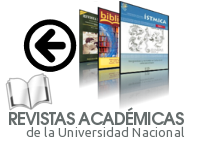“If Social Studies is Wrong, I Don’t Want to be Right”: Analysis of Wayne Ross’ Thinking and Its Relevance for Social Studies in Costa Rica
DOI:
https://doi.org/10.15359/rp.25.2Keywords:
Social Studies, secondary education, teacher education, educational theory, epistemologyAbstract
This article investigates Wayne Ross’s construction and problematization on topics such as: teaching practice, educational curriculum and “Social Studies”. It seeks to bring social studies teachers —both graduates and in training— closer to their thinking. At the same time, promote the debate and the problematization of teaching in the face of the challenges of the 21st century. For this purpose, we start from a theoretical review of some of his articles, books and academic chapters. The article ends with two specific points: the first is a general balance of Wayne Ross's thinking and the changes —or continuations— that his thinking has throughout his career; and the second is an invitation to the epistemic debate of Social Studies according to the current context of the country and the ideas of Ross.
References
Clift, R., & Larson, A. (1994). “Emphasizing the Personal in Research on Teachers’ Thinking: an Essay-Review of Teacher Personal Theorizing: Connecting Curriculum Practice, Theory, and Research” [reseña del libro: The Social Studies Curriculum. Purposes, Problems, and Possibilities de E. W. Ross (ed.)]. Teaching & Teacher Education, 10(1), 121-124. https://doi.org/10.1016/0742-051X(94)90045-0
Donnelly, D. (2015). “Review: The Social Studies Curriculum. Purposes, Problems, and Possibilities” [reseña del libro The Social Studies Curriculum. Purposes, Problems, and Possibilities de E. W. Ross (ed.)]. Journal of International Social Studies, 5(1), 153-154. https://www.iajiss.org/index.php/iajiss/article/view/191
Fanelli, C. (2015). “Critical Education and Insurgent Pedagogies: An Interwiew with E. Wayne Ross”. Alternate Routes, 26, 405-422. http://www.alternateroutes.ca/index.php/ar/article/view/22329
Gómez-Luna, E., Fernando-Navas, D., Aponte-Mayor, G., Betacourt-Buitrago, L. (2014). “Metodología para la revisión bibliográfica y la gestión de información de temas científicos, a través de su estructuración y sistematización”. DYNA, 81(184), 158-163. https://www.redalyc.org/articulo.oa?id=49630405022
González Sánchez, D. (2020). La enseñanza de los estudios sociales en la era de la calidad educativa. Revista Perspectivas: Estudios Sociales y Educación Cívica, (20), 1-27. https://doi.org/10.15359/rp.20.2
González Sánchez, D. (2020). “Los estudios sociales de cara a la historia: Provocaciones para un debate urgente”. Actualidades Investigativas en Educación, 20(1), 1-18. https://doi.org/10.15517/AIE.V20I1.40176
Gónzalez Sánchez, D. (2021). “Unas primeras palabras: Estudios sociales y epistemología. Aportes para repensar la investigación en enseñanza de los estudios sociales”. Revista Perspectivas: Estudios Sociales y Educación Cívica, (22), 1-10. https://www.revistas.una.ac.cr/index.php/perspectivas/article/view/15363
Grammes, T. (2015). “Review of the Book: The Social Studies Curriculum. Purposes, Problems, and Possibilities” [reseña del libro The Social Studies Curriculum. Purposes, Problems, and Possibilities de E. W. Ross (ed.)]. Journal of Social Science Education, 14(3), 98-99. https://doi.org/10.2390/jsse-v14-i3-1472
Pagès-Blanch, J., Sant, E. & Villa-Sepúlveda, M. (2015). “Interview with Professor E. Wayne Ross”. Revista Educación y Pedagogía, 27(69-70), 147-158. https://revistas.udea.edu.co/index.php/revistaeyp/article/view/340184
Plá-Pérez, S. (2020). “Ciudadanía crítica y estudios sociales para el presente”. Revista Perspectivas: Estudios Sociales y Educación Cívica, (20), 1-15. https://doi.org/10.15359/rp.20.1
Ramírez-Achoy, J. & Pagès-Blanch. (2019). “Pensar históricamente en la universidad: ¿Cómo aprende historia el futuro profesorado de Estudios Sociales en Costa Rica?”. En: M. Hortas, A. Dias & N. De Alba (Eds.), Enseñar y aprender didáctica de las ciencias sociales: La formación del profesorado desde una perspectiva sociocrítica (pp. 789-798). Escola Superior de Educação, Instituto Politécnico de Lisboa, AUPDCS.
Ramírez-Achoy, J. & Pagès-Blanch. (2020). “Los desafíos de enseñar Historia en la formación inicial en Estudios Sociales. Un estudio de caso en el contexto costarricense”. Sophia Austral, (26), 115-129. http://www.sophiaaustral.cl/index.php/shopiaaustral/article/view/353
Ross, W. & Hannary, L. (1986). “Towards a Critical Theory of Reflective Inquiry”. Journal of Teacher Education, 37(4), 9-15. https://doi.org/10.1177/002248718603700402
Ross, W. (1987). “Teacher Perspective Development: A Study of Preservice Social Studies Teachers”. Theory and Research in Social Education, 15(4), 225-243. https://doi.org/10.1080/00933104.1987.10505547
Ross, W. (1992). “Critical Constructivism and the Use of Knowledge about Teaching”. Teacher Education Quarterly, 19(2), 19-31. https://www.jstor.org/stable/23475123
Ross, W. (2004). “Negotiating the Politics of Citizenship Education”. PS: Political Science & Politics, 37(2), 249-251. https://www.jstor.org/stable/4488814
Ross, W. (ed.). (2014). The Social Studies Curriculum (4a. ed.). State University of New York Press.
Ross, W & Marker, P. (2005). “(If Social Studies is Wrong) I Don't Want to be Right”. Theory & Research in Social Education, 33(1), 142-151. https://doi.org/10.1080/00933104.2005.10473275
Ross, W. & Marker, P. (2009). “Social Studies Teacher Education: Dare We Teach for Democracy?”. Teacher Education Quarterly, 36(1), 3-7. https://www.jstor.org/stable/i23478862
Published
How to Cite
Issue
Section
License
Los autores que publican en esta revista están de acuerdo con los siguientes términos:
a) Los autores conservan los derechos de autor y garantizan a la revista el derecho de ser la primera publicación del trabajo bajo una Licencia Creative Commons Atribución-NoComercial-CompartirIgual 4.0 Internacional (https://creativecommons.org/licenses/by-nc-sa/4.0/) que permite a otros compartir el trabajo con un reconocimiento de la autoría del trabajo y la publicación inicial en esta revista (componente BY o atribución). Coincidente con la política de Acceso Abierto, no se podrán hacer usos comerciales de los contenidos publicados por esta revista (componente NC). Se permitirán las obras derivadas (remezcla, transformación o creación a partir de la obra original) siempre y cuando sean distribuidas bajo la misma licencia de la obra original (componente SA).
b) Los autores pueden establecer por separado acuerdos adicionales para la distribución no exclusiva de la versión original de la obra publicada en la revista (por ejemplo, situarlo en un repositorio institucional o publicarlo en un libro), siempre y cuando: a) sea reconocida la publicación original en esta revista (componente BY); b) no se haga uso del material de reuso con propósitos comerciales (componente NC); c) el material de reuso sea distribuido bajo la misma licencia de la obra original (componente SA).
c) Se permite y se anima a los autores a difundir sus trabajos electrónicamente (por ejemplo, en repositorios institucionales o en su propio sitio web) antes y durante el proceso de envío, ya que puede dar lugar a intercambios productivos, así como a una citación más temprana y mayor de los trabajos publicados (Véase The Effect of Open Access) (en inglés).


_11.55_.09_a_._m_._.png)
_1.34_.01_p_._m_._2.png)
_9.45_.02_p_._m_._.png)




_2.23_.09_p_._m_._.png)
_2.35_.17_p_._m_._.png)

